Mono Success Story: Plastic
I have been exchanging some emails with Pablo from CodiceSoftware a Spanish startup that is building software configuration management tools using .NET and Windows.Forms called Plastic.
Pablo's email on the subject:
We started Códice Software (www.codicesoftware.com) in August 2005, and since then we have developed a new SCM system, full written in C#. It runs on Mono from the beginning, in fact, our automated NUnit based system always tests on Linux/Mono (pnunit.codicesoftware.com).
Our intention building this new SCM was having something as powerful as Clearcase (ok, without some features like build enhacements and so on) but easy to use and fast (in some operations we are even faster than Perforce...), and also affordable to any-sized team. [Emphasis added]
This is what the software looks like on Windows:
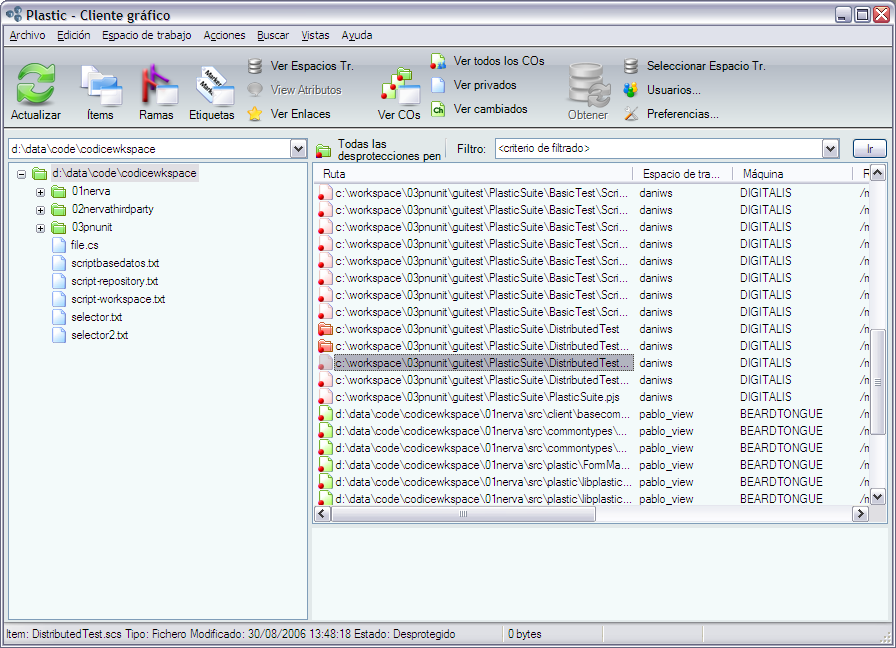
In addition, they have developed a three way merge tool using OpenGL to render the view:
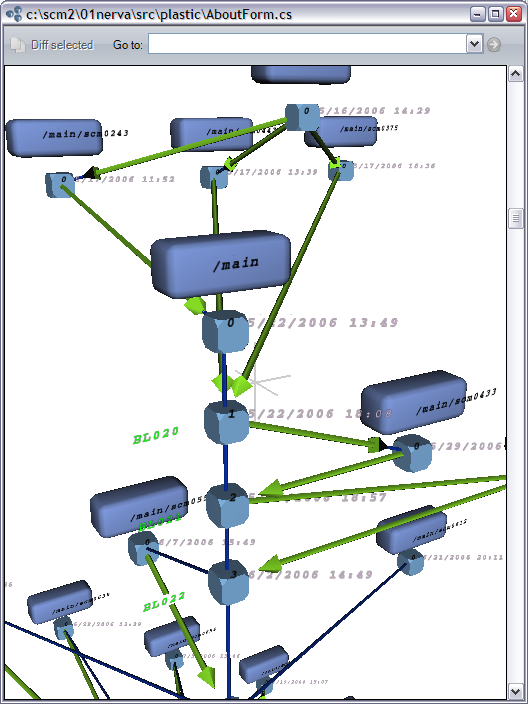
This is what it looks like in Linux running with Mono's Windows.Forms:
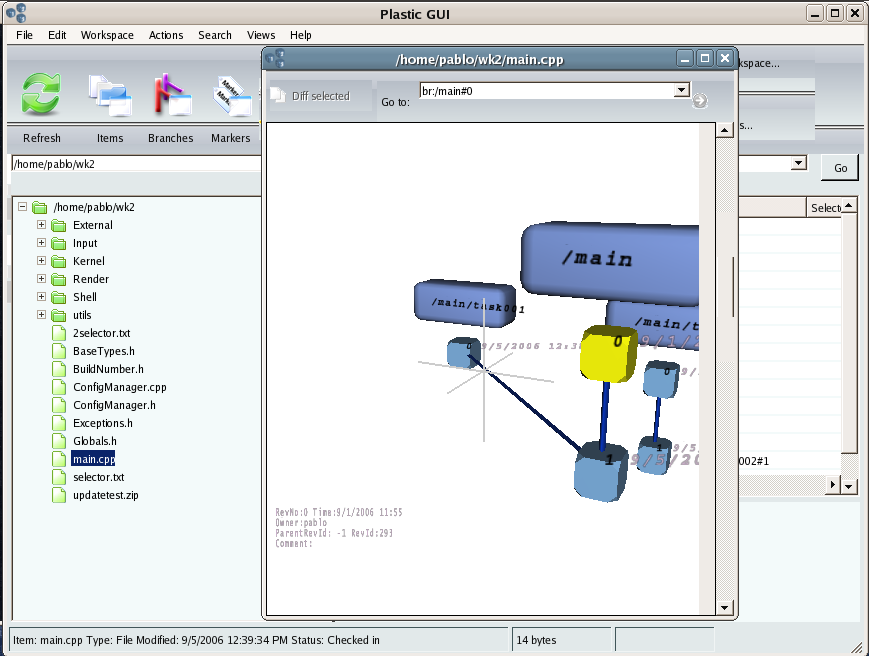
There are a couple of rendering glitches here and there, but other than that, its looking pretty sweet.
Posted on 05 Sep 2006
VBNC Compiles Hello World on Linux
Rolf's excellent Visual Basic compiler was able to bootstrap itself a few weeks ago on Windows, but it did not work with Mono yet.
The compiler needed the VB runtime to be upgraded, it required a few fixes in the way we handle interface implementation for generics in the Mono VM, the final bug today was reference file names with their proper casing.
Also Rolf's compiler contained a few MS-specific hacks in the compiler, but those are no longer necessary so this afternoon the VB compiler was able to build Hello World on Linux:
$ mono vbnc.exe a.vb
DEBUG RUN
Visual Basic.Net Compiler version 0.0.0.4706 (last write time: 05/09/2006 21:06:28)
Copyright (C) 2004-2006 Rolf Bjarne Kvinge. All rights reserved.
Starting Scan
Scanning file /home/cvs/vbnc/vbnc/bin/a.vb
File '/home/cvs/vbnc/vbnc/bin/a.vb' scanned in 0.118 seconds
7 lines and 115 characters in total.
After SCAN: True
Starting Conditional Compilation
After ConditionaL True
Starting Parse
Parsing file /home/cvs/vbnc/vbnc/bin/a.vb (1 of 1 files)
3 assemblies were loaded.
73 namespaces were loaded.
2129 types were loaded.
Starting Resolve
Starting Resolve
CreateImplicitTypes compiler (1 of 1 types)
ResolveType compiler (1 of 1 types)
ResolveTypeReferences compiler (1 of 1 types)
CreateImplicitMembers compiler (1 of 1 types)
ResolveMembers compiler (1 of 1 types)
ResolveCode compiler (1 of 1 types)
Finished Resolve
DefineTypes compiler (1 of 1 types)
DefineTypeParameters compiler (1 of 1 types)
DefineTypeHierarchy compiler (1 of 1 types)
DefineMembers compiler (1 of 1 types)
Starting Emit
Emit compiler (1 of 1 types)
CreateType compiler (1 of 1 types)
Creating: compiler
Created: compiler
Assembly 'a, Version=0.0.0.0, Culture=neutral' saved successfully to '/home/cvs/vbnc/vbnc/bin/a.exe'.
Compilation successful
The "DEBUG" run is a tiny bit verbose as you can see, the results are mind blowing:
mono$ cat a.vb
public class compiler
shared function Main as integer
Console.WriteLine ("Dingus")
return 0
End function
end class
mono$ mono a.exe
Dingus
Am actually scared of trying to bootstrap on Mono, I do not know if there are enough pixels in my machine to build the 68,000 lines of VB that the compiler has.
Posted on 05 Sep 2006
Italy Trip
I think we have decided on what we will be doing in Italy.
We arrive to Pisa on September 16th, and we will head to the Elba island in the afternoon with the other speakers to the Elba island for the LASER Lectures.
After Elba, we will go to Rome on the 22nd or 23rd for the most part of that week.
Our plan is to go from Rome to Firenze and then to Pisa to take our airplane back home.
With this in mind: could we arrange some talks in Rome and Firenze (if there are Mono/Linuxers/.NETers there?)
Posted on 05 Sep 2006
Workflow in Mono
A few days ago, Mono contributor Jordi Mas posted on his blog about the work that he has done to create an open source implementation of the Workflow APIs to Mono.
He announced his work here and provided the details about it here.
Scott Guthrie posts a couple of pointers to interesting tutorials on Workflow:
There are no screenshots at this time to spice up this blog entry, but here is the output of running the NUnit tests:
MONO_PATH=`pkg-config mono --variable prefix`/lib/mono/2.0:"../../class/ lib/net_3_0::$MONO_PATH" mono --debug ../../class/lib/net_3_0/nunit-console.exe /output:TestResult-net_3_0.log /exclude:NotWorking,ValueAdd,CAS,InetAccess /xml:TestResult-net_3_0.xml System.Workflow.Activities_test_net_3_0.dll || ok=false; \ sed '1,/^Tests run: /d' TestResult-net_3_0.log; \ $ok NUnit version 2.2.0 Copyright (C) 2002-2003 James W. Newkirk, Michael C. Two, Alexei A. Vorontsov, Charlie Poole. Copyright (C) 2000-2003 Philip Craig. All Rights Reserved. OS Version: Unix 2.6.16.21 Mono Version: 2.0.50727.42 Excluded categories: NotWorking,ValueAdd,CAS,InetAccess .......... Tests run: 10, Failures: 0, Not run: 0, Time: 0.245039 seconds
Exciting.
Posted on 05 Sep 2006
Tangerine
Today I finally upgraded my home server which was running ancient software so I could run Tangerine for sharing my mp3s on the home network over DAAP.
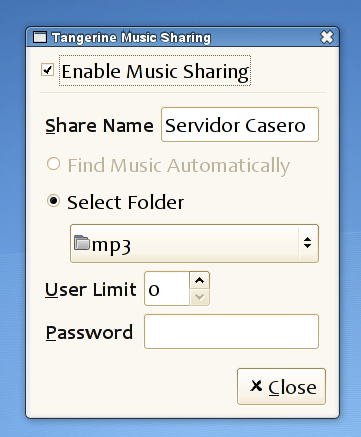
Worked like a charm.
Posted on 03 Sep 2006
F-Spot with PicasaWeb Export
Gonzalo Paniagua developed a couple of new libraries: google-sharp to access a few Google services, and in particular Picasa and gnome-keyring-sharp, to access the Gnome Keyring from .NET applications.
gnome-keyring-sharp is a completely managed implementation, it basically speaks the keyring protocol instead of using a P/Invoke binding to call into native libraries, which is convenient as it is one dependency less on running applications.
Stephane Delcroix then developed a GUI for F-Spot to register your accounts, manage your albums and upload your pictures from F-Spot, the SVN version now has this fancy dialog box:
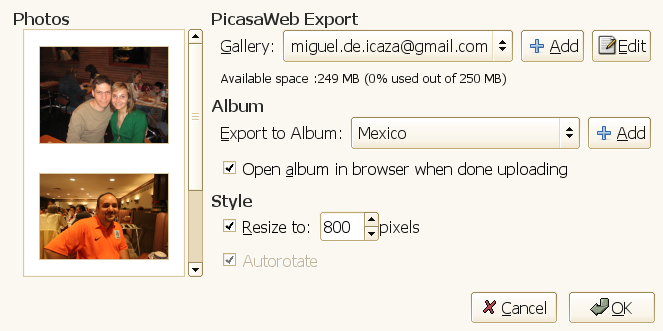
My first uploaded gallery from F-Spot is here.
Which reminds me, while traveling in Europe in July, I ran into the 12 Euro computer in a museum. I kid you not.
12 Euros, that is quite a good price. It is going to be hard for the OLPC guys to compete with that 100 dollar price tag, it has a surprisingly similar design, they also fold and they are also have quite an innovative design.
Judge for yourself here.
Posted on 02 Sep 2006
Martin Baulig, super hacker
Martin has been working for the past couple of weeks on fixing a bug in the Mono C# compiler: how to properly compile an anonymous method inside a generic method.
The problem started with an innocent looking program:
delegate void Foo ();
class X
{
static void Hello<U> (U u)
{ }
static void Test<T> (T t)
{
Foo foo = delegate {
Hello (t);
};
}
}
The issue is that when we generated the anonymous method for "foo", we had to turn the "T" generic method parameter into a generic *class* parameter:
.class nested private auto ansi sealed beforefieldinit 'AnonHelp<0>'extends [mscorlib]System.Object { .field assembly !0 'p:t' }
The code to cope with this in the compiler was fairly ugly, and Martin embarked on fixing the design internals at the end of July. We originally thought that there were two solutions: an elegant solution that required some refactoring and an ugly hack that basically accessed System.Reflection.Emit directly and poked at these internals from the anonymous method code path.
I have never quite liked what I did with the implementation of anonymous methods; I have tried to bounce the ideas off a few people to try to get their feeling on how to redo this code. I explained the design to Federico and Gonzalo hoping to get some feedback on the bugs and to clarify my own thoughts.
So to make a long story short, I did not like what was going on in the internals of the compiler; and in addition there are some annoying side effects and various constructs that crash the compiler when nested anonymous methods are used or when iterators and anonymous are mixed.
On Friday, Martin sent his weekly status report where he officially has removed my design mistakes. He has eliminated CaptureContext's from the compiler, and has eliminated the special-cases that coped with captured variables in the compiler --another part piece of code that worked, but was far from elegant--.
The new code that Martin has written replaced chunks of code that has bugged me for more than a year, so these are great news.
The patch is available here
In addition, cleaning up this code is essential as C# 3.0 will make extensive use of this infrastructure as part of the new lambda function support (This is because in C# 3.0 it is very natural for developers to create nested lambdas and anonymous methods, something that was more of a curiosity with the C# 2.0 syntax).
Btw, Martin just had a birthday, and he likes chocolates ;-)
Posted on 02 Sep 2006
A To-Do list for Bittorrent Sharp
Alan has updated the list of TODO activities for BitSharp.
Posted on 02 Sep 2006
BitTorrent, half a tone up
This year, during the summer of code three students worked on Bittorrent support for Mono/.NET. Each one was in charge of an independent piece: a bittorrent downloading (Alan), a tracker (Gregor) and the GUI (Piotr).
The code has now moved from our incubator repository to the public and it is available on SVN or you can get a tarball of it.
The code is licensed under the terms of the MIT X11 license, which means, anyone can embed it anywhere.
If you make fixes or improve the code, it would be nice for you to contribute those back. Let the sharp bitorrenting begin!
Screenshots will come later.
Posted on 01 Sep 2006
Authoring File Systems with Mono on Linux
On Linux it is possible to write user-level file system by using FUSE, a toolkit to write user-space tools that can be mounted as file systems.
There is a whole scene of Fuse developers, to satisfy the most unique tastes in file system needs. Cryptographic file systems, gmail-as-a-backing-store, and of course a Wikipedia file system.
Jon Pryor has released Mono and FUSE bridge: Mono.Fuse. With Mono.Fuse it is possible to author file system extensions with Mono using any of the libraries or languages supported by Mono.
To create a file system with Mono.Fuse, you must create a class that derives from Mono.Fuse.FileSystem, like this:
using Mono.Fuse
class TypeNavigator : FileSystem {
static void Main (string [] args)
{
using (TypeNavigator t = new TypeNavigator ()){
t.MountPoint = args [0];
t.Start ();
}
}
}
Then you need to implement a couple of methods, you override the directory reading and attribute fetching methods like this:
protected override Errno OnReadDirectory (string path, [Out] out string[] paths, OpenedFileInfo fi)
{
...
}
protected override Errno OnGetFileAttributes (string path, ref Stat stbuf)
{
...
}
I wrote a small file system to browse assemblies, you can get the source here.
To run my toy file system, do this:
$ mono fuse.exe /tmp/u
That will get the file system going (currently you need the Mono.Fuse.dll library in the same directory where fuse.exe lives, and the libMonoFuseHelper.so in your library path).
With this, you can browse the types in your favorite assemblies from the shell (or for the less manly hackers in my readership: a file manager) like this:
$ ls /tmp/u/mscorlib ... Mono.Security.Cryptography.RSAManaged+KeyGeneratedEventHandler/ Mono.Security.Cryptography.SymmetricTransform/ Mono.Security.PKCS7/ Mono.Security.PKCS7+ContentInfo/ Mono.Security.PKCS7+EncryptedData/ Mono.Security.PKCS7+EnvelopedData/ ... $ ls /tmp/u/mscorlib/Mono.Security.Cryptography.SymmetricTransform CanReuseTransform GetHashCode OutputBlockSize CanTransformMultipleBlocks get_InputBlockSize ToString Equals get_OutputBlockSize TransformBlock get_CanReuseTransform GetType TransformFinalBlock get_CanTransformMultipleBlocks InputBlockSize
Once you are done with the exciting world of browsing your assemblies with ls and cd you can umount your file system like this:
$ fusermount -u /tmp/u
Very nice work Jon!
Posted on 01 Sep 2006
« Newer entries | Older entries »
Blog Search
Archive
- 2024
Apr Jun - 2020
Mar Aug Sep - 2018
Jan Feb Apr May Dec - 2016
Jan Feb Jul Sep - 2014
Jan Apr May Jul Aug Sep Oct Nov Dec - 2012
Feb Mar Apr Aug Sep Oct Nov - 2010
Jan Feb Mar Apr May Jun Jul Aug Sep Oct Nov Dec - 2008
Jan Feb Mar Apr May Jun Jul Aug Sep Oct Nov Dec - 2006
Jan Feb Mar Apr May Jun Jul Aug Sep Oct Nov Dec - 2004
Jan Feb Mar Apr May Jun Jul Aug Sep Oct Nov Dec - 2002
Jan Feb Mar Apr May Jun Jul Aug Sep Oct Dec
- 2022
Apr - 2019
Mar Apr - 2017
Jan Nov Dec - 2015
Jan Jul Aug Sep Oct Dec - 2013
Feb Mar Apr Jun Aug Oct - 2011
Jan Feb Mar Apr May Jun Jul Aug Sep Oct Nov Dec - 2009
Jan Feb Mar Apr May Jun Jul Aug Sep Oct Nov Dec - 2007
Jan Feb Mar Apr May Jun Jul Aug Sep Oct Nov Dec - 2005
Jan Feb Mar Apr May Jun Jul Aug Sep Oct Nov Dec - 2003
Jan Feb Mar Apr Jun Jul Aug Sep Oct Nov Dec - 2001
Apr May Jun Jul Aug Sep Oct Nov Dec